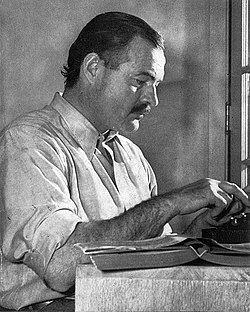Ernest Hemingway Quote
He smelled the odor of the pine boughs under him, the piney smell of the crushed needles and the sharper odor of the resinous sap from the cut limbs. ... This is the smell I love. This and fresh-cut clover, the crushed sage as you ride after cattle, wood-smoke and the burning leaves of autumn. That must be the odor of nostalgia, the smell of the smoke from the piles of raked leaves burning in the streets in the fall in Missoula. Which would you rather smell? Sweet grass the Indians used in their baskets? Smoked leather? The odor of the ground in the spring after rain? The smell of the sea as you walk through the gorse on a headland in Galicia? Or the wind from the land as you come in toward Cuba in the dark? That was the odor of cactus flowers, mimosa and the sea-grape shrubs. Or would you rather smell frying bacon in the morning when you are hungry? Or coffee in the morning? Or a Jonathan apple as you bit into it? Or a cider mill in the grinding, or bread fresh from the oven?
He smelled the odor of the pine boughs under him, the piney smell of the crushed needles and the sharper odor of the resinous sap from the cut limbs. ... This is the smell I love. This and fresh-cut clover, the crushed sage as you ride after cattle, wood-smoke and the burning leaves of autumn. That must be the odor of nostalgia, the smell of the smoke from the piles of raked leaves burning in the streets in the fall in Missoula. Which would you rather smell? Sweet grass the Indians used in their baskets? Smoked leather? The odor of the ground in the spring after rain? The smell of the sea as you walk through the gorse on a headland in Galicia? Or the wind from the land as you come in toward Cuba in the dark? That was the odor of cactus flowers, mimosa and the sea-grape shrubs. Or would you rather smell frying bacon in the morning when you are hungry? Or coffee in the morning? Or a Jonathan apple as you bit into it? Or a cider mill in the grinding, or bread fresh from the oven?
Related Quotes
About Ernest Hemingway
Hemingway was raised in Oak Park, Illinois, a suburb of Chicago. After high school, he spent six months as a reporter for The Kansas City Star before enlisting in the Red Cross. He served as an ambulance driver on the Italian Front in World War I and was seriously wounded by shrapnel in 1918. In 1921, Hemingway moved to Paris, where he worked as a foreign correspondent for the Toronto Star and was influenced by the modernist writers and artists of the "Lost Generation" expatriate community. His debut novel, The Sun Also Rises, was published in 1926. In 1928, Hemingway returned to the U.S., where he settled in Key West, Florida. His experiences during the war supplied material for his 1929 novel A Farewell to Arms.
In 1937, Hemingway went to Spain to cover the Spanish Civil War, which formed the basis for his 1940 novel For Whom the Bell Tolls, written in Havana, Cuba. During World War II, Hemingway was present with Allied troops as a journalist at the Normandy landings and the liberation of Paris. In 1952, his novel The Old Man and the Sea was published to considerable acclaim, and won the Pulitzer Prize for Fiction. On a 1954 trip to Africa, Hemingway was seriously injured in two successive plane crashes, leaving him in pain and ill health for much of the rest of his life. He committed suicide at his house in Ketchum, Idaho, in 1961.
